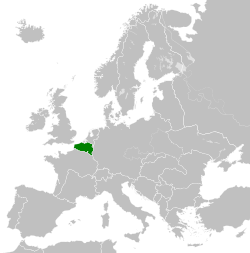Military Administration in Belgium and Northern France
This article needs additional citations for verification. (August 2009) |
Military Administration in Belgium and Northern France Militärverwaltung in Belgien und Nordfrankreich | |||||||||||||||||||
|---|---|---|---|---|---|---|---|---|---|---|---|---|---|---|---|---|---|---|---|
| 1940–1944 | |||||||||||||||||||
 | |||||||||||||||||||
| Status | Territory under German military administration | ||||||||||||||||||
| Capital | Brussels | ||||||||||||||||||
| Common languages | Dutch French German | ||||||||||||||||||
| Military Commander | |||||||||||||||||||
• 1940 | Gerd von Rundstedt | ||||||||||||||||||
• 1940–1944 | Alexander von Falkenhausen | ||||||||||||||||||
| Administrator | |||||||||||||||||||
• 1940–1944 | Eggert Reeder | ||||||||||||||||||
| Historical era | World War II | ||||||||||||||||||
• Established | 1940 | ||||||||||||||||||
• Disestablished | 1944 | ||||||||||||||||||
| |||||||||||||||||||
Reichskommissariat Belgien-Nordfrankreich | |||||||||||
|---|---|---|---|---|---|---|---|---|---|---|---|
| 1944–1944 | |||||||||||
| Status | Reichskommissariat of Germany | ||||||||||
| Capital | Brussels | ||||||||||
| Common languages | German (official) Dutch French (local) | ||||||||||
| Government | Civil administration | ||||||||||
| Reichskommissar | |||||||||||
• 1944 | Josef Grohé | ||||||||||
| Historical era | World War II | ||||||||||
• Führer Decree | 12 July 1944 | ||||||||||
• Allied liberation | begins September 1944 | ||||||||||
• Annexation to Germany | December 1944 | ||||||||||
| Currency | RKK (de facto) | ||||||||||
| |||||||||||
The Military Administration in Belgium and Northern France (German: Militärverwaltung in Belgien und Nordfrankreich) was an interim occupation authority established by Nazi Germany that included present-day Belgium and the French departments of Nord and Pas-de-Calais.[1] It remained in existence until July 1944. Plans to transfer Belgium from the military administration to a civilian administration were promoted by the SS, and Hitler had been ready to do so until Autumn 1942, when he put off the plans for the time being.[2] The SS had suggested either Josef Terboven or Ernst Kaltenbrunner as the Reich Commissioner of the civilian administration.[3] On 18 July 1944 Gauleiter Josef Grohé was named the Reichskommissar of the Reichskommissariat of Belgium and Northern France (Reichskommissariat Belgien und Nordfrankreich or Reichskommissariat für die besetzten Gebiete von Belgien und Nordfrankreich).[1][4]
The Nazi administration was assisted by fascist Flemish, Walloon, and French collaborationists. In binational Belgian territory, the predominantly French region of Wallonia, the collaborationist Rexists provided aide to the Nazis while in Flemish-populated Flanders, the Flemish National Union supported the Nazis. In Northern France, Flemish separatist tendencies were stirred by the pro-Nazi Vlaamsch Verbond van Frankrijk led by priest Jean-Marie Gantois.[5]
The attachment of the departments Nord and Pas-de-Calais to the military administration in Brussels was initially made on military considerations, and was supposedly done in preparation for the planned invasion of Britain.[6] Ultimately, the attachment was based on Hitler's intention to move the Reich's border westward, and was also used to maintain pressure on the Vichy regime - which protested the curtailment of its authority in what was still de jure national French territory - to ensure its good behavior.[7]
Command structure

Military Administration in Belgium and Northern France Militärverwaltung in Belgien und Nordfrankreich Part of the Wehrmacht Militärbefehlshaber: Alexander von Falkenhausen | Sipo-SD Part of the Sicherheitspolizei-Sicherheitsdienst Independent of the Military Administration and directed from Berlin. | ||||||||||||||||||||||||||||||||||||
Military Administrative Staff Militärverwaltungsstab Militärverwaltungschef: Eggert Reeder | Command Staff Kommandostab Chef des Kommandostabs: Bodo von Harbou | ||||||||||||||||||||||||||||||||||||
Committee of Secretaries-General Representatives of the Belgian civil administration | Economic Department Wirtschaftsabteilung | Feldgendarmerie and Geheime Feldpolizei | Geheime Staatspolizei (Gestapo) Part of the SS | ||||||||||||||||||||||||||||||||||
Belgian civil service: Burgomasters and local government; Belgian police and state security | Regional and district headquarters: Oberfeld-, Feld- or Kreiskommandanten | Belgian collaborationist groups Principally the Vlaams Nationaal Verbond (VNV) or Rex; Each with internal command structure. | |||||||||||||||||||||||||||||||||||
Based on description in Van den Wijngaert, Mark; Dujardin, Vincent (2006). "La Belgique sans Roi, 1940-1950". Nouvelle Historie de Belgique. Vol. 2: 1905-1950. Brussels: Éd. Complexe. pp. 19–20. ISBN 2-8048-0078-4.
See also
- Battle of Belgium
- Belgium in World War II
- Reichsgau Flandern
- Reichsgau Wallonien
- District of Brussels
References
- ^ a b http://territorial.de/belgnord/reikobel.htm
- ^ Kroener, Müller & Umbreit (2003) Germany and the Second World War V/II, p. 26
- ^ Kroener, Müller & Umbreit (2003) Germany and the Second World War V/II, p. 27
- ^ Kroener, Müller & Umbreit (2003) Germany and the Second World War V/II, p. 29
- ^ Kroener, Bernhard R.; Müller, Rolf-Dieter; Umbreit, Hans (2000). Germany and the Second World War:Organization and mobilization of the German sphere of power. Wartime administration, economy, and manpower resources 1939-1941. Oxford University Press. p. 84. ISBN 0198228872.
- ^ Jackson, Julian (2003). France: the dark years, 1940-1944. Oxford University Press. p. 169. ISBN 0199254575.
- ^ Kroener et al. (2000), p. 84


